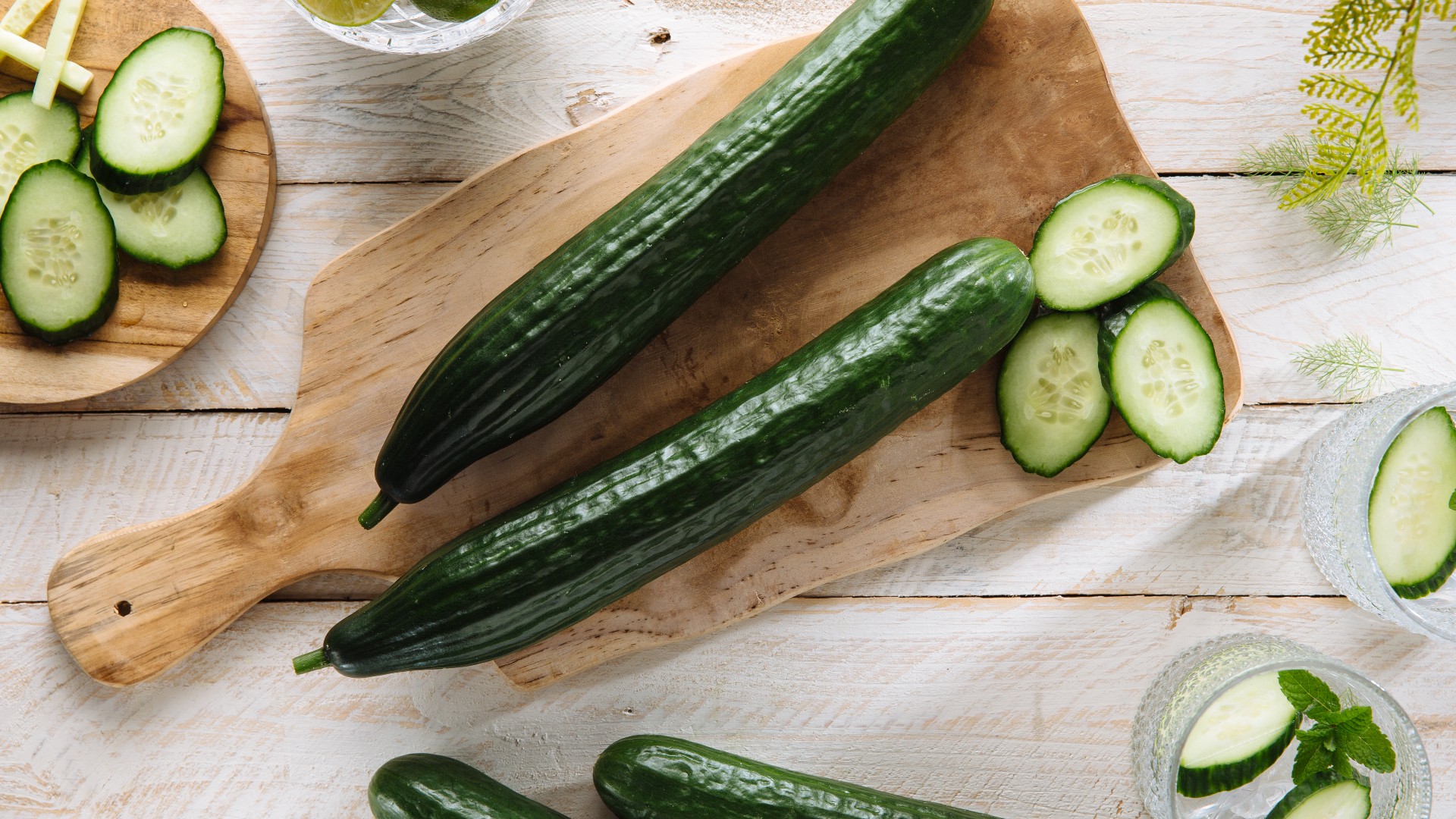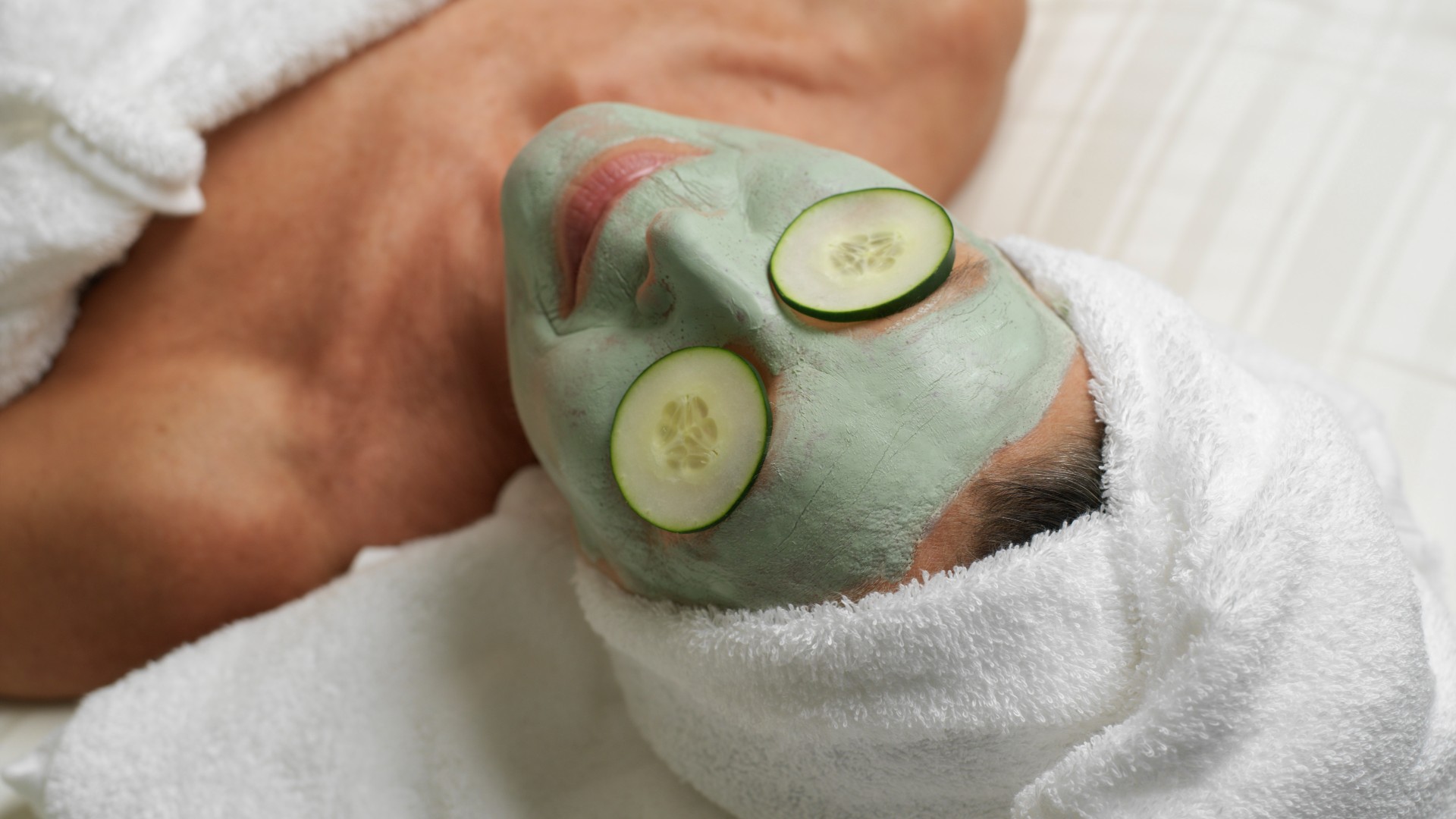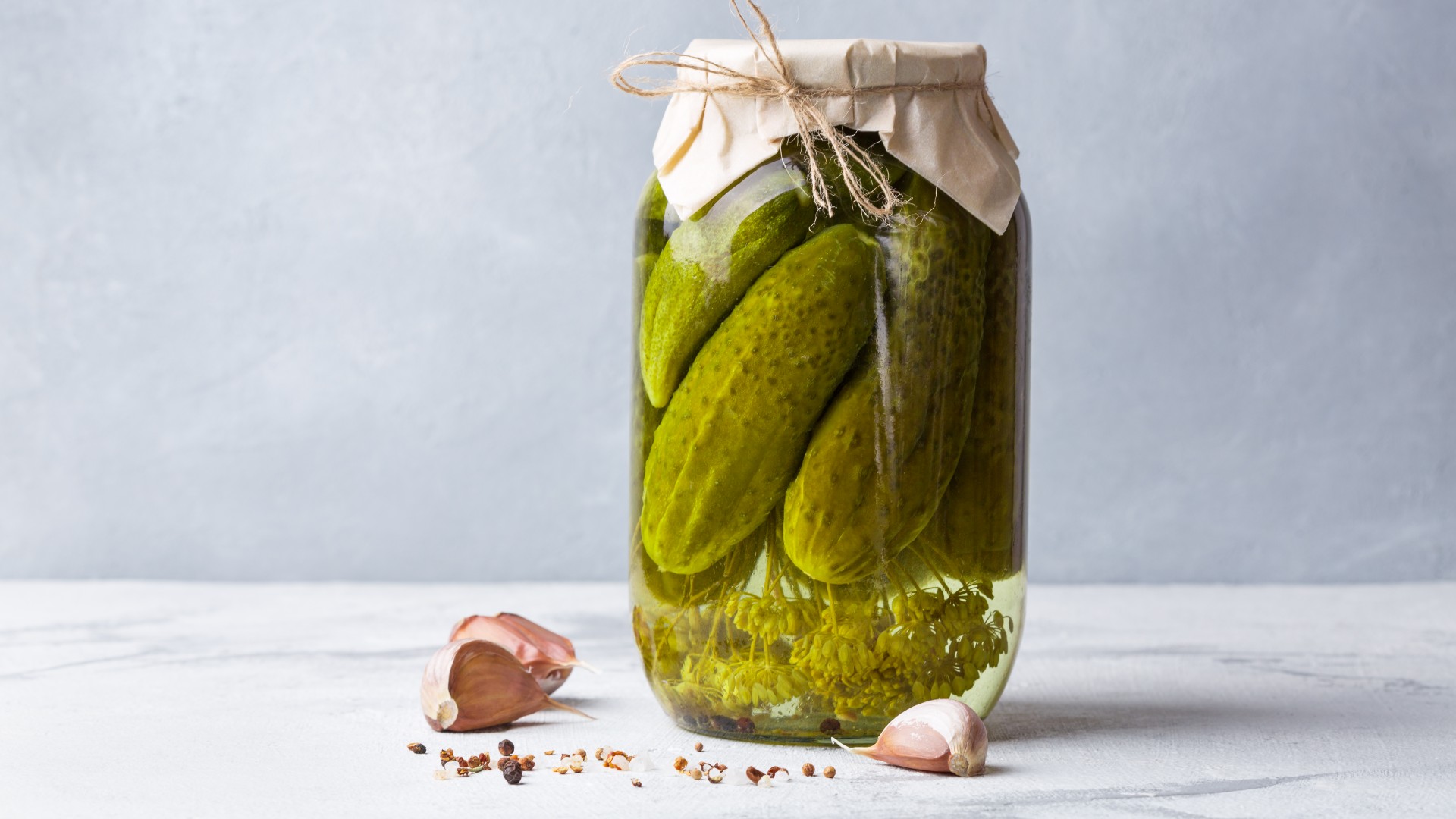Cucumbers: Nutrition facts and health benefits
Few foods are as cool as a cucumber, but did you know all the benefits of this amazing fruit?

- What is the nutritional profile of a cucumber?
- Benefits for hydration
- What phytonutrients are in cucumbers?
- Does cucumber have skin benefits?
- Are cucumbers high in antioxidants?
- Can cucumbers benefit heart health?
- Can cucumbers benefit digestion?
- Things to watch out for
- What are pickles?
- Additional Resources
Few foods, as they say, are as cool as a cucumber. A cucumber's nutritional benefits are ideal for healthy eating, because these low-calorie veggies contain many hydrating properties and valuable nutrients. In 2019, the cucumber was even elevated to the status of superfood, according to Men's Health.
There are hundreds of varieties of cucumber, and they come in dozens of colors (including white, yellow and orange according to Nutritional Outlook), but the edible types are classified as being for either slicing or pickling, according to Cornell University's Growing Guide. Slicing cucumbers are cultivated to be eaten fresh, while pickling cucumbers are intended for the brine jar — the former are also usually larger and thicker-skinned than the pickling variety.
In the United States, commonly planted varieties of slicing cucumber include Dasher, Conquistador, Slicemaster, Victory, Comet, Burpee Hybrid and Sprint, according to Gardener's Path website. Commonly planted varieties of pickling cucumber include Royal, Calypso, Pioneer, Bounty, Regal, Duke and Blitz.
While most people think of cucumbers as vegetables, they are actually a fruit. They contain seeds and grow from the ovaries of flowering plants. Cucumbers are members of the plant family Cucurbitaceae, which also includes squashes and melons. The most common type of slicing cucumber found in a grocery store is the garden cucumber, Cucumis sativus, according to Plants For a Future.
What is the nutritional profile of a cucumber?
Cucumbers are good sources of phytonutrients (plant chemicals that have protective or disease preventive properties) such flavonoids, lignans and triterpenes, which have antioxidant, anti-inflammatory and anti-cancer benefits. "We should definitely seek out foods that are nutrient-rich, using the positive approach of what to put on your plate vs. what to keep off," said Angela Lemond, a Plano, Texas-based registered dietitian nutritionist. The peel and seeds are the most nutrient-dense parts of the cucumber. They contain fiber and beta-carotene. "Beta carotene is an antioxidant that helps with immunity, skin, eye and the prevention of cancer," said Lemond. A study published in the Pakistan Journal of Nutrition found that cucumber seeds were a good source of minerals, and contained calcium.
"Cucumbers are naturally low in calories, carbohydrates, sodium, fat and cholesterol," said Megan Ware, a registered dietitian nutritionist in Orlando, Florida. There are just 16 calories in a cup of cucumber with its peel (15 without). You will get about 4% of your daily potassium, 3% of your daily fiber and 4% of your daily vitamin C. They also "provide small amounts of vitamin K, vitamin C, magnesium, potassium, manganese and vitamin A," Ware said.
Here is everything you need to know about cucumber nutrition, according to the U.S. Food and Drug Administration, which regulates food labeling through the Nutritional Labeling and Education Act:
Get the world’s most fascinating discoveries delivered straight to your inbox.
| Nutrition Facts Cucumber, with peel, raw Serving size: 1/2 cup, sliced (52 g) Calories 8 Calories from Fat 0 *Percent Daily Values (%DV) are based on a 2,000 calorie diet. | ||||
| Amt per Serving | %DV* | Row 1 - Cell 2 | Amt per Serving | %DV* |
| Total Fat 0g | 0% | Row 2 - Cell 2 | Total Carbohydrate 2g | 1% |
| Cholesterol 0mg | 0% | Row 3 - Cell 2 | Dietary Fiber 0g | 0% |
| Sodium 1mg | 2% | Row 4 - Cell 2 | Sugars 0g | Row 4 - Cell 4 |
| Protein 0g | Row 5 - Cell 1 | Row 5 - Cell 2 | Row 5 - Cell 3 | Row 5 - Cell 4 |
| Vitamin A | 1% | Row 6 - Cell 2 | Calcium | 1% |
| Vitamin C | 2% | Row 7 - Cell 2 | Iron | 1% |
Do cucumbers help with hydration?
Cucumbers are 95% water, according to WebMD . This makes cucumbers a great way to stay hydrated, especially during the summer.
"They say we can get 20-30 percent of our fluid needs through our diet alone, and foods like these certainly help," added Lemond. "Not only are they high in water content, they also contain important nutrients that play a part in hydration like magnesium and potassium."
What phytonutrients are in cucumbers?
Cucumbers contain two interesting phytonutrient compounds: lignans and cucurbitacins. According to a 2010 research review published in Scientific World Journal, scientists have found that, in cell culture that cucurbitacins can help block the signaling pathways that are important for cancer cell proliferation and survival.
Cucurbitacins can also inhibits the growth of pancreatic cancer cells, according to a 2009 study published in the Journal of Cancer Research.
Does cucumber have skin benefits?

You've probably seen pictures of people at a spa relaxing with cucumber slices over their eyes. It turns out there's science behind this pampering ritual. Ware explained, "Cucumbers have a cooling and soothing effect that decreases swelling, irritation and inflammation when used topically. Cucumber slices can be placed on the eyes can decrease morning puffiness or alleviate and treat sunburn when placed on the affected areas." She also noted that high vegetable intake is associated with a healthy complexion in general.
Are cucumbers high in antioxidants?
"Foods that are high in antioxidants allow your body to function optimally. Antioxidants help prevent damage and cancer," Lemond said.
Cucumbers contain several antioxidants, including vitamin C, beta-carotene and manganese, as well as flavonoids, triterpenes and lignans that in lab dishes have anti-inflammatory properties. Beta-carotene has been shown to be beneficial for vision, according to the American Optometric Association .
Can cucumbers benefit heart health?

"Eating a variety of fruits and vegetables of all kinds is associated with a reduced risk for many health conditions, such as heart disease, diabetes, stroke and obesity," said Ware.
Potassium may be especially helpful in this regard. One cup of sliced cukes contains only about 4% of the body's daily potassium needs, but it comes with significantly fewer calories than other high-potassium foods like bananas. Potassium is an essential part of heart health, according to the American Heart Association. A 2012 study of 12,000 adults, published in Archives of Internal Medicine, showed that those who consumed 4,069 mg of potassium each day lowered their risk of cardiovascular disease and ischemic heart disease by 37% and 49%, respectively, compared to those who took 1,793 mg per day.
Several studies have linked cucumber consumption to reducing hypertension. Many studies have linked it with lower blood pressure because it promotes vasodilation (widening of the blood vessels), according to Today’s Dietitian. A 2017 study published in Public Health of Indonesia found that 20 elderly participants with hypertension saw a significant decrease in blood pressure after consuming cucumber juice for 12 days.
Can cucumbers benefit digestion?
Tufts University notes that cucumbers can pack even more of a digestive punch if they are turned into pickles during a home-fermentation process. Cucumber pickles contain probiotic bacteria that promote healthy digestion and cultivating beneficial gut flora. Store-bought pickles usually do not have these bacteria because they have been boiled out.
Things to watch out for
There can be a few risks from eating cukes. Pesticide consumption is one concern. Ware explained, "The Environmental Working Group produces a list each year of fruits and vegetables with the highest levels of pesticide residue, known as the Dirty Dozen. Cucumbers are one of the fruits and vegetables that the Environmental Working Group has placed on its Dirty Dozen list, meaning the exposure to pesticide residue is high." As of 2022, cucumber was still featured on the list, this time at number 17.
Additionally, cucumbers may be waxed to help protect them during shipping. According to World's Healthiest Foods, both organic and conventionally grown cukes may be waxed, but organic ones can only use non-synthetic waxes with chemicals approved under organic regulations. For this reason and the pesticide concerns, World's Healthiest Foods encourages buying organic cucumbers. But Ware stipulated, "This does not mean you should avoid cucumbers altogether if you can't find or afford organic. The nutritional benefit of eating conventionally grown produce outweighs the risk of not eating produce at all."
Healthy as they are, you don't want to overdo it on cucumbers, said Lemond. "My recommendation is always to vary your selections. Cucumbers are great hydrating foods, so keep them in along with other plant foods that offer other benefits. Variety is always key."
What are pickles?

Pickling is a method of preserving food — and not only cucumbers — to prevent spoiling. There are two basic types of pickles: fermented and non-fermented, according to the Exploratorium .
Fermented pickles have been soaked in brine, which is water that has been saturated with salt. The word "pickle" comes from the Dutch word pekel, which means brine. Brines can also contain other ingredients, such as vinegar, dill seed, garlic and lime. The cucumber gets pickled when bacterial fermentation occurs in the brine, creating the sour taste. Non-fermented pickles are boiled and use vinegar to create the distinctive sour taste of the pickle.
Dill pickles are brined with dill added to the solution, obviously. Kosher dills are brined with dill and garlic. "Kosher" in this case does not necessarily mean the cucumbers have been prepared according to kosher dietary laws, however; it just means garlic has been added to the brining process, according to Insane in the Brine.
Gherkin pickles are usually just immature cucumbers, according to Masterclass.
Additional Resources
For those wishing to grow their own cucumbers, Cornell University has a handy Cucumber Growing Guide. If you are looking for other foods with health benefits then check out Cleveland Clinic's list of 7 Foods That Will Satisfy Your Thirst and Hunger.

Callum McKelvie is features editor for All About History Magazine. He has a both a Bachelor and Master's degree in History and Media History from Aberystwyth University. He was previously employed as an Editorial Assistant publishing digital versions of historical documents, working alongside museums and archives such as the British Library. He has also previously volunteered for The Soldiers of Gloucestershire Museum, Gloucester Archives and Gloucester Cathedral.
 Live Science Plus
Live Science Plus





